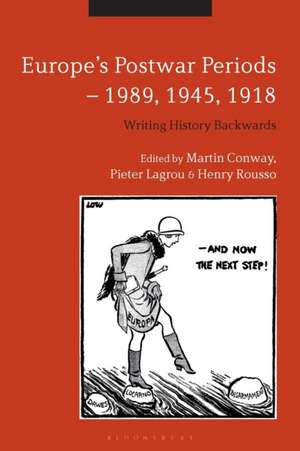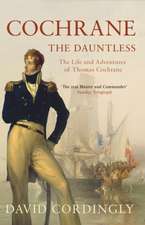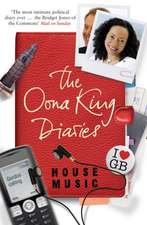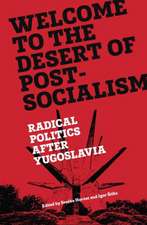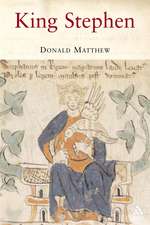Europe's Postwar Periods - 1989, 1945, 1918: Writing History Backwards
Editat de Professor Martin Conway, Pieter Lagrou, Henry Roussoen Limba Engleză Paperback – 24 iun 2020
| Toate formatele și edițiile | Preț | Express |
|---|---|---|
| Paperback (1) | 224.29 lei 6-8 săpt. | |
| Bloomsbury Publishing – 24 iun 2020 | 224.29 lei 6-8 săpt. | |
| Hardback (1) | 656.96 lei 6-8 săpt. | |
| Bloomsbury Publishing – 12 dec 2018 | 656.96 lei 6-8 săpt. |
Preț: 224.29 lei
Preț vechi: 288.65 lei
-22% Nou
Puncte Express: 336
Preț estimativ în valută:
42.92€ • 46.77$ • 36.16£
42.92€ • 46.77$ • 36.16£
Carte tipărită la comandă
Livrare economică 23 aprilie-07 mai
Preluare comenzi: 021 569.72.76
Specificații
ISBN-13: 9781350170056
ISBN-10: 1350170054
Pagini: 248
Dimensiuni: 156 x 234 x 17 mm
Greutate: 0.35 kg
Editura: Bloomsbury Publishing
Colecția Bloomsbury Academic
Locul publicării:London, United Kingdom
ISBN-10: 1350170054
Pagini: 248
Dimensiuni: 156 x 234 x 17 mm
Greutate: 0.35 kg
Editura: Bloomsbury Publishing
Colecția Bloomsbury Academic
Locul publicării:London, United Kingdom
Caracteristici
Contains contributions from leading scholars from the UK, Germany, Poland, Ireland, Italy, the Netherlands, France, Belgium and Hungary
Notă biografică
Martin Conway is Professor of Contemporary European History at the University of Oxford, UK. He is the author of The Sorrows of Belgium: Liberation and Political Reconstruction 1944-47 (2012), Catholic Politics in Europe 1918-1945 (1997) and Collaboration in Belgium (1993). Pieter Lagrou is Professor of contemporary European history at the Université Libre de Bruxelles, Belgium. He is the author of The Legacy of Nazi Occupation: Patriotic Memory and National Recovery in Western Europe, 1945-1965 (1999). Henry Rousso is Senior Researcher at the Centre National de la Recherche Scientifique at the Institut d'histoire du temps présent, Paris, France. He coordinated the European Network on Contemporary History (EURHISTXX). He recently published The Latest Catastrophe: History, the Present, the Contemporary (2016).
Cuprins
Preface - Henry Rousso (French National Centre for Scientific Research, France)Introduction - Martin Conway (University of Oxford, UK)1. Borders - Dariusz Stola (Polish Academy of Sciences and Warsaw University, Poland)2. Demobilizations - John Horne (Trinity College Dublin, Ireland)3. Empires - Malika Rahal (French National Centre for Scientific Research, France)4. States - Pieter Lagrou (Université Libre de Bruxelles, Belgium)5. Democracy - Martin Conway (University of Oxford, UK)6. Pasts - Peter Apor (Institute of History of the Hungarian Academy of Sciences, Hungary) and Henry Rousso (French National Centre for Scientific Research, France)7. Justice - Annette Weinke (Friedrich Schiller University, Germany) and Guillaume Mouralis (National Centre for Scientific Research, France)8. Markets - Paolo Capuzzo (University of Bologna, Italy)9. Futures - Peter Apor (Institute of History of the Hungarian Academy of Sciences, Hungary)Conclusion - Thomas Lindenberger (University of Potsdam, Germany)BibliographyIndex
Recenzii
Europe's Postwar Periods excels at challenging the narrative of modern European history . The innovative approach of this book makes it a must-read for those looking to dissect the past in an unconventional way-to see postwar periods for what they were, and most important, for what they were not.
A truly innovative and European perspective that sheds a new and stimulating light on 20th European history, its specificity, creativity and openness by rereading it through the present lens and analysing the changes following WWI and WWII from the changes following 1989.
A truly innovative and European perspective that sheds a new and stimulating light on 20th European history, its specificity, creativity and openness by rereading it through the present lens and analysing the changes following WWI and WWII from the changes following 1989.
